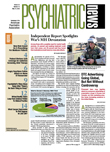An appellate court decision in April has shielded the makers of sertraline and paroxetine from a product liability lawsuit alleging that the companies failed to warn the public adequately of the increased risk of suicidality in the product labeling.
The decision was issued for the combination of two cases, Colacicco v. Apotex Inc. et al. and McNellis v. Pfizer Inc., brought by the families of two adult patients with depression who committed suicide after taking these drugs. The plaintiffs argued that the drug companies did not sufficiently disclose the risk that these antidepressants entail and were thus responsible for the deaths. The drug companies argued that the Food and Drug Administration's (FDA) approval and regulation of the products' labeling supersedes liability claims in the state court.
The preemption argument has been used as a key defense by pharmaceutical companies in many liability suits, including a class-action suit against Johnson and Johnson over the Ortho Evra birth-control patch, according to an April 6 New York Times report. In 2006 the FDA announced its current official position that agreed with the industry and insisted that its approval of drug labeling trumps state liability laws and court actions.
The decision by the U.S. Court of Appeals for the 3rd Circuit, located in Philadelphia, was based primarily on the FDA's review and determination that there is no convincing evidence to connect antidepressants and increased risk of suicidal tendencies in adults. The court concluded in a 2-1 vote that the failure-to-warn claims “conflict with, and are therefore preempted by, the FDA's regulatory actions,” Chief Judge Dolores Sloviter wrote. Thus, the companies were deemed not liable.
The ruling does not establish a precedent for most liability suits against pharmaceutical companies based on state law, however. Sloviter was careful to note that this decision is “limited to circumstances in which the FDA has publicly rejected the need for a warning that plaintiffs argue state law requires.”
Various court decisions in recent years have been inconsistent and sometimes contradictory regarding pharmaceutical liability claims and on the question of whether FDA regulation preempts all state liability actions. The U.S. Supreme Court recently voted 4-4 in the Warner-Lambert v. Kent case in which the plaintiff claimed to be harmed by the drug company's deception of the FDA. That decision allowed the case to go forward in state court (Psychiatric News, April 4). The federal preemption debate over liability of pharmaceutical companies is expected to be more clearly defined in a pending Supreme Court decision in Wyeth v. Levine.
The court's decision is posted at<www.ca3.uscourts.gov/opinarch/063107p.pdf>.▪
